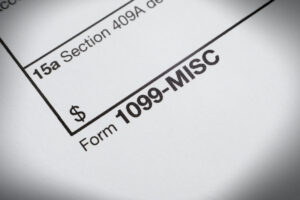[ad_1]
 Chances are you received money from friends, family, or clients through a payment app like Venmo, Google Pay, Cash App, or PayPal. Some of it might be for fee payments while others might be for reimbursements. A few people separated their business related transactions from their personal ones, while most probably didn’t and commingled funds.
Chances are you received money from friends, family, or clients through a payment app like Venmo, Google Pay, Cash App, or PayPal. Some of it might be for fee payments while others might be for reimbursements. A few people separated their business related transactions from their personal ones, while most probably didn’t and commingled funds.
Earlier this year, the American Rescue Plan of 2021 amended the federal tax law to require payment app developers to issue Form 1099s if the total amount paid to a person from the app in a calendar year is over $600. Previously, these apps issued 1099s only to those who engaged in more than 200 transactions exceeding $20,000.
The problem is that $600 is not a lot of money these days. It wouldn’t be unusual for casual reimbursements to exceed $50 per month. So many people would be subject to this reporting requirement. Also, there was no guidance from the IRS as to how the income would be reported and how nontaxable expenses would be deducted. Without guidance, most people would have to include a Schedule C on their tax returns to report the income and claim deductions to offset the income. This would also mean that they would have to purchase the most expensive version of tax software.
Another problem is that to comply with the law, payment apps will require users to disclose their social security number and may require verification in order to continue using the app. This might decrease their user base who may turn to cash or crypto.
Fortunately, the IRS has recently announced that they will delay the reporting requirement for all transactions in 2021. In it, the IRS Acting Commissioner stated that the additional time will help reduce confusion during the upcoming 2023 tax filing season and provide more time for taxpayers to prepare and understand the new reporting requirements. It also stated that the law is not intended to track personal transactions such as sharing the cost of a car ride or meal, birthday or holiday gifts, or paying a family member or another for a household bill.
While the announcement answers a few questions, it doesn’t answer others. The main one is why Congress didn’t increase the minimum reporting threshold in 2021 when the law was written. Around this time last year, I wrote a column which showed that the $600 threshold was established in 1954 and has not since been adjusted for inflation. If adjusted for inflation, the $600 in 1954 would be worth almost $6,200 in November 2021. The AICPA, a CPA trade organization, has also expressed concern about the outdated amount and has warned that the low reporting threshold would confuse taxpayers, increase the already huge backlog of unprocessed tax returns held by the IRS, leading them to issue incorrectly and unfairly assessed penalties and interest.
The other unanswered question is how the 1099 income would be reported and how to claim those that are not taxable. For small amounts (let’s say under $10,000), it is likely that the IRS will create a simplified form where taxpayers will certify that the entire amount received through payment apps are not income subject to tax. But for larger amounts, the IRS may require a full disclosure of income and expenses.
So how can people prepare for the upcoming reporting requirement in the meantime? First, use Zelle as a payment method if possible. Zelle states that it does not report transactions made on its network to the IRS. Their rationale is that the Zelle network does not hold funds. Instead, it manages automated clearinghouse (ACH) transactions that are not subject to 1099 reporting. This is better for personal transactions as business income must be reported for income tax purposes whether they are on a 1099 or not.
Another way to minimize confusion is to create separate accounts on payment apps. One account would be for business transactions and the other for personal ones. While this could sound burdensome, this would be a good option for those who use payment apps frequently.
While the IRS announcement of delaying the 1099 reporting requirements is good news for many people who use payment apps, unless the law changes those requirements will come eventually. In the meantime, hopefully the law will be tweaked to minimize burdens for those who use these apps for nontaxable transactions.
Steven Chung is a tax attorney in Los Angeles, California. He helps people with basic tax planning and resolve tax disputes. He is also sympathetic to people with large student loans. He can be reached via email at stevenchungatl@gmail.com. Or you can connect with him on Twitter (@stevenchung) and connect with him on LinkedIn.
[ad_2]




